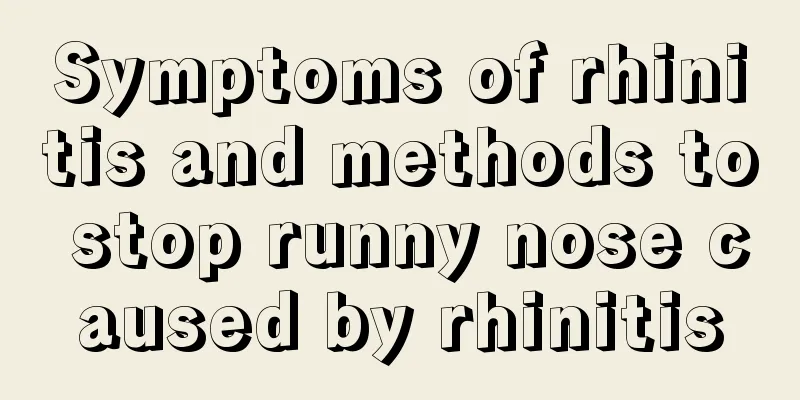Bile reflux gastritis can be cured by doing this

|
Bile reflux gastritis is a stomach disease that generally presents symptoms such as abdominal distension, stomach pain, stomach bleeding, etc. It will cause a feeling of fullness in the stomach and can also easily lead to nausea, black and dark stools, etc. It can be treated with medication or surgery. Bile reflux gastritis treatment 1. Medication (1) Gastrokinetic drugs: They can increase gastrointestinal motility, inhibit bile reflux into the stomach, and promote the emptying of refluxed materials. Commonly used ones are: Domperidone (Mostrin), Mosapride (Synalonate), etc. (2) There are many types of gastric mucosal protective agents. Their main functions include combining with the mucin of the gastric mucosa to form a protective film to reduce the irritation of the gastric mucosa by refluxed bile and gastric acid, strengthen the function of the gastrointestinal mucosal barrier, promote the regeneration of the gastric mucosa, and promote the secretion of mucus by the gastric mucosa, thereby protecting the gastric mucosa and promoting the healing of inflammation. (3) Bile salt-binding drugs: ① Daxil (magnesium aluminum carbonate), which combines with bile acid and lysophosphatidylcholine, thereby reducing the damage of bile salts to the gastric mucosa. It has a significant effect on bile reflux gastritis and is the main drug used clinically; ② Anion exchange resin (cholestyramine), which releases chloride ions after oral administration and combines with bile acid to form an insoluble, non-absorbable complex, accelerating the excretion of bile salts and feces, and reducing gastric mucosal damage. (4) Gastric acid inhibitors: Gastric acid and bile have additive effects and can cause strong damage to the gastric mucosa. Acid inhibitors are also effective against bile reflux. ①H2 receptor blockers (H2RA): cimetidine, ranitidine, famotidine; ②Proton pump inhibitors (PPI): omeprazole, lansoprazole, rabeprazole, toprazole, and esomeprazole, which have acid-suppressing effects far superior to H2 receptor blockers. (5) Eradicating Helicobacter pylori infection: Bile reflux gastritis can coexist with Helicobacter pylori infection. While routinely using acid suppressants, gastric mucosal protective agents and gastrokinetic drugs for treatment, eradication of Helicobacter pylori should be considered first. It not only helps the lesions to heal, but also reduces the chance of inducing cancer. 2. Surgery It is mainly suitable for patients with severe symptoms who have not responded to medical treatment. Commonly used surgical procedures include Roux-en-Y surgery or biliary shunt. 3. Diet adjustment Eat a light diet and avoid greasy food to avoid stimulating increased bile secretion, aggravating reflux and the condition. You should chew slowly and avoid overeating. Avoid drinking strong tea, strong alcohol, strong coffee, and eating spicy, too cold, too hot, and rough foods. 4. Remove certain factors that aggravate the condition This includes quitting smoking and drinking, avoiding mental stress, keeping a good mood, and not taking or taking with caution medications that are irritating to the gastric mucosa. |
<<: These new drugs can treat lung cancer
>>: You don't know the correct enema method
Recommend
Why are smokers more likely to get lung cancer? In addition to quitting smoking, you should also pay attention to these 4 points to prevent lung cancer
Although smoking can be called a personal choice,...
Why do tongue ulcers recur?
Tongue ulcers, also known as oral ulcers, are rel...
Is the stone-removing and gallbladder-removing granule effective?
The Stone-Removing and Gallbladder-Removing Granu...
During the traditional festival, what are the requirements for the New Year’s Eve dinner?
Chinese traditional culture has a long history, a...
Let me introduce the surgical treatment of melanoma to patients
The surgical treatment of melanoma is a treatment...
What does hb mean
In this world we live in, there are many complete...
What is uterine teratoma
What is uterine teratoma? Uterine teratoma is one...
Which part is the cardia?
Many people do not know where the cardia is in th...
What foods are better for hypertrophic cardiomyopathy
Patients with hypertrophic cardiomyopathy need to...
What are the local symptoms of lymphoma
Lymphoma, also known as "lymphoma", is ...
Is it useful to take vitamin B for athlete's foot?
Athlete's foot is not common in people's ...
What are the causes of high creatine kinase?
We may not know much about creatine kinase. Creat...
What should patients with bile duct cancer pay attention to in terms of diet
What should patients with bile duct cancer pay at...
How to check for early symptoms of melanoma
When a person is sick, he or she will think about...
The more common causes of esophageal cancer
Esophageal cancer is a malignant tumor that threa...









